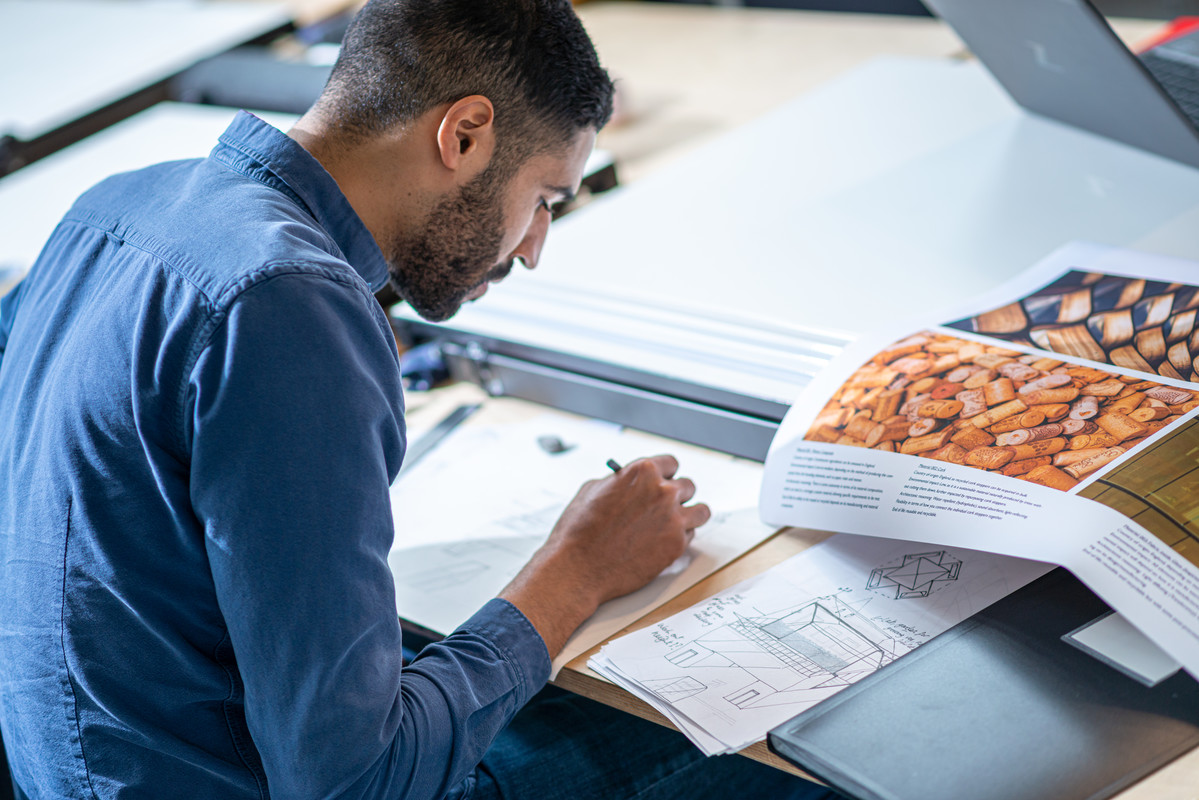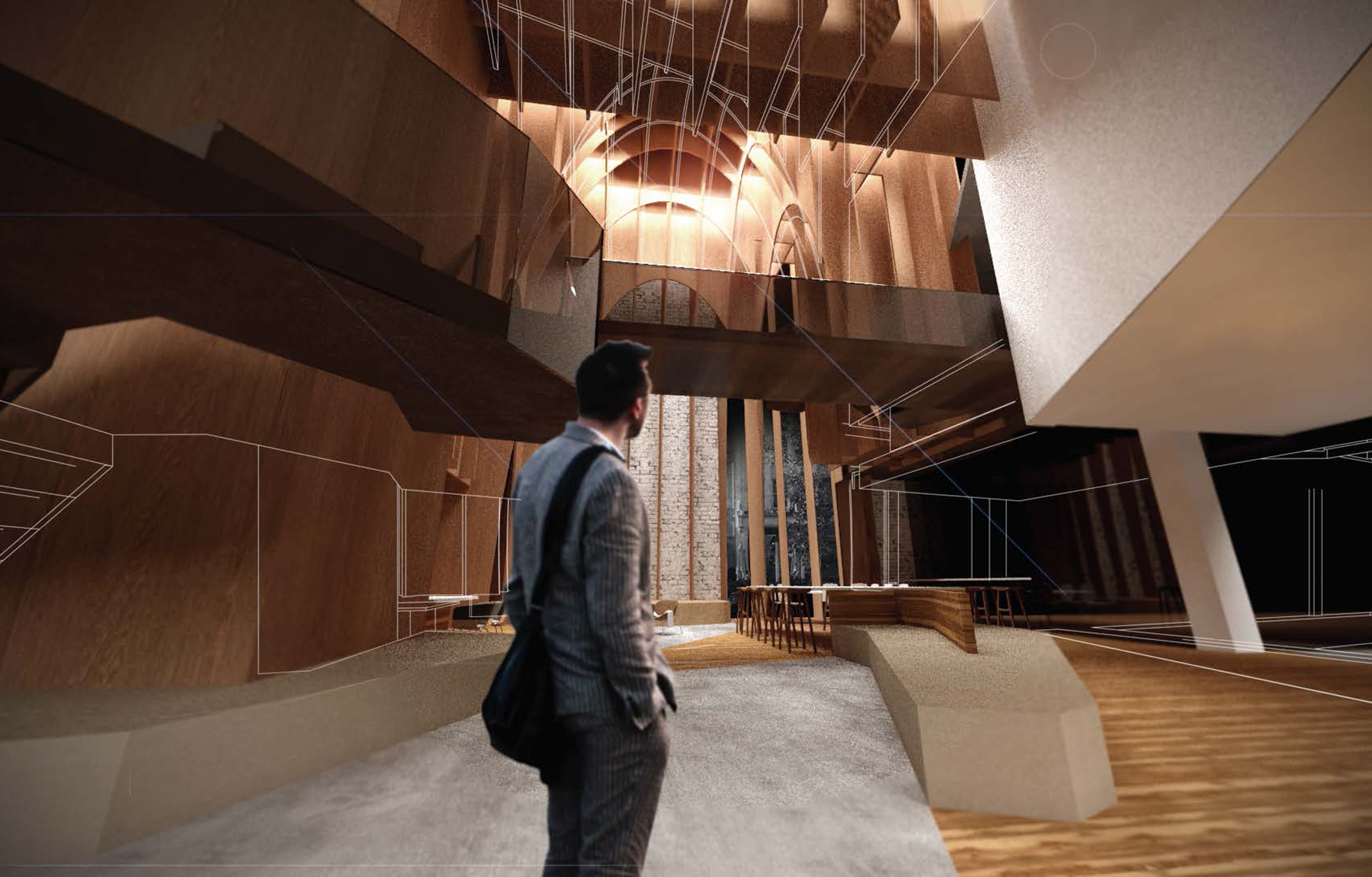Studio Practice (Interior Design) (top-up) at UCA
Our Studio Practice top-up course in Interior Design at UCA Canterbury will give you the chance to gain all the skills you need to progress to postgraduate study and boost your knowledge and experience.
Ideal for international students and also suitable to UK students looking to build upon existing qualifications, this course is aligned with our final year undergraduate students' studies, enabling you to progress to a Master's course in a streamlined way.
You'll get right into the action from the start, undertaking research and practical projects , working on collaborative activities and building your skills, knowledge and confidence.
What you'll
study
The content of the course may be subject to change. Curriculum content is provided as a guide.
Your studies will align with the work undertaken by final year undergraduate students throughout the School of Architecture & Design, with high-level contextual research and the production of a portfolio ready for your career.
Projects 05
Through construction of a multi-layered narrative, you'll develop and then resolve a complex project that supports the notion that interior architecture and design moves beyond providing just shelter. You'll address issues of creative and intellectual stimulation to ensure design proposals stimulate the mind as well as the body.
You'll focus on the adaptive reuse of a building/space through surveying, information gathering, critical analysis, conceptualisation, design development, drawing to scale and making.
Cultural Context 03
This is a research-led unit comprising two parts. The first part is a critical writing exercise - you'll produce a critical argument that demonstrates an understanding of interior design through analysis and evaluation of relevant research materials. The second part is a visual essay, which is in response to your own self-directed research question.
Professional Practice
This unit is a chance to showcase your creative identity, aligned to your career aspirations. Using the RIBA Plan of Work Stages, you will produce a report on your final project. You'll also produce a portfolio of work in the form of a designed career package that will form an integral part of the assessment. A light version will be prepared to send out to proposed employers for your self initiated work experience. Presentation and communication skills will also be developed and evaluated through a simulated interview.
Course specifications
Please note, syllabus content indicated is provided as a guide. The content of the course may be subject to change in line with our Student Terms and Conditions for example, as required by external professional bodies or to improve the quality of the course.
Explore our gradshow
Each year, we’re privileged to be able to share our graduates’ incredible work with the world. And now’s your chance to take a look.
Visit the online showcaseFees & financial support
Tuition fees - 2024/25 entry
- BA (top-up) course: £9,250
Tuition fees - 2024/25 entry
- BA (top-up) course: £9,250 (see fee discount information)
Tuition fees - 2024/25 entry
- BA (top-up) course: £16,950
Please note: The fees listed on this webpage are correct for the stated academic year only, for details of previous years please see the full fee schedules.
UCA scholarships and fee discounts
At UCA we have a number of scholarships and fee discounts available to assist you with the cost of your studies.
Financial support
There are lots of ways you can access additional financial support to help you fund your studies - both from UCA and from external sources. Discover what support you might qualify for please see our financial support information.
Additional course costs
In addition to the tuition fees there may be other costs for your course. The things that you are likely to need to budget for to get the most out of a creative arts education will include books, printing costs, occasional or optional study trips and/or project materials.
These costs will vary according to the nature of your project work and the individual choices that you make. Please see the Additional Course Costs section of your Course Information for details of the costs you may incur.
Facilities
There are open plan studio spaces for each year of the course, used for group tutorials and personal working. Facilities for the course include: laser cutters, 3D printers, virtual reality lab, 3D workshop with machines for working in wood, metals, plastics and ceramics and fully-equipped computer studios with Macs and PCs programmed with software for design and animation.
/prod01/channel_8/media/marketing-media/campuses/canterbury/facilities/architecture-studios/341-1120-341-1120-Architecture-studios,-UCA-Canterbury_1.jpg)
Course studios, UCA Canterbury
/prod01/channel_8/media/marketing-media/campuses/canterbury/facilities/architecture-fablab/FabLab,-UCA-Canterbury_2015_3.jpg)
Fabrication Lab, UCA Canterbury
/prod01/channel_8/media/marketing-media/campuses/canterbury/facilities/architecture-traklab/Architecture-TraKLAB,-UCA-Canterbury,-Dec-15-4.png)
Architecture TrakLab, UCA Canterbury
/prod01/channel_8/media/marketing-media/campuses/canterbury/facilities/architecture-studios/Architecture-studios,-UCA-Canterbury_2015_2.jpg)
Digital suites, UCA Canterbury

What’s it like being a student at UCA?
That’s a big question. Get some answers from people who are studying right here, right now.
Entry & portfolio
requirements
BA (Hons) course (top-up)
The standard entry requirements* for this course are:
- 240 credits from a relevant degree (120 credits at level 4 and 120 credits at level 5), with a minimum of 55% overall
- Foundation Degree in a relevant subject
- Higher National Diploma in a relevant subject
And/or Accreditation of Prior Experiential Learning (APEL)
In recognition that you may already have a relevant professional qualification, or appropriate working experience in the relevant industries, APEL may be accepted for entry on to the course. This will be based on the partnership articulations and will be assessed on a case by case basis.
Other relevant and equivalent UK and international qualifications are considered on an individual basis, and we encourage students from diverse educational backgrounds to apply.
Portfolio requirements
For this courses, we’ll need to see your portfolio for review. We’ll invite you to attend an Applicant Day so you can have your portfolio review in person, meet the course team and learn more about your course. Further information will be provided once you have applied. View more portfolio advice
*We occasionally make offers which are lower than the standard entry criteria, to students who have faced difficulties that have affected their performance and who were expected to achieve higher results. We consider the strength of our applicants’ portfolios, as well as their grades - in these cases, a strong portfolio is especially important.
BA (Hons) course (top-up)
The entry requirements for these courses will depend on the country your qualifications are from, please check the equivalent qualifications for your country:
Any additional entry requirements listed in the UK requirements section, e.g., subject requirements, work experience or professional qualifications, also apply to international applicants applying with equivalent qualifications.
Portfolio requirements
You will be required to submit a portfolio for review. Further information on specific portfolio requirements and how to submit your portfolio will be sent to you after we have reviewed your application. View more portfolio advice
English language requirements
To study at UCA, you'll need to have a certain level of English language skill. And so, to make sure you meet the requirements of your course, we ask for evidence of your English language ability, please check the level of English language required:
Don't meet the international entry requirements or English language requirements?
You may be able to enter the course through the following entry pathways:
